How to Be a More Inclusive Community: Equity for Women in the Church Workshop at Memphis Theological Seminary
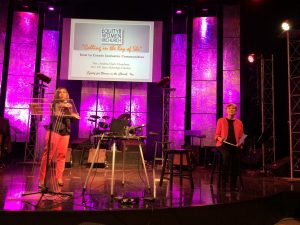 It was a joy to co-lead with Rev. Andrea Clark Chambers an Equity for Women in the Church “Calling in the Key of She” workshop at Memphis Theological Seminary’s Scholars Week. Our workshop, “How to Be a More Inclusive Community,” addressed changing church and society from patriarchal to egalitarian so that the gifts of all are equally valued and included.
It was a joy to co-lead with Rev. Andrea Clark Chambers an Equity for Women in the Church “Calling in the Key of She” workshop at Memphis Theological Seminary’s Scholars Week. Our workshop, “How to Be a More Inclusive Community,” addressed changing church and society from patriarchal to egalitarian so that the gifts of all are equally valued and included.
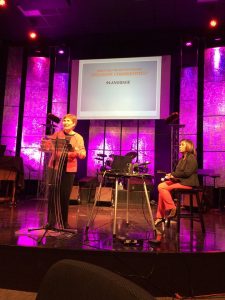 We began by talking about the importance of language to this transformation. Words matter. Recent events in our country show the power of words to hurt and to heal. Words have consequences. Racist and anti-Semitic words have stirred people to commit horrific hate crimes.
We began by talking about the importance of language to this transformation. Words matter. Recent events in our country show the power of words to hurt and to heal. Words have consequences. Racist and anti-Semitic words have stirred people to commit horrific hate crimes.
Misogynistic and sexist language also stirs up violence. What we seldom hear is that almost all the perpetrators of these violent acts are male. They are the products of toxic masculinity resulting from the sin of patriarchy. Church historian Rev. Dr. Courtney Pace states: “Patriarchy is at the root of every systemic evil, including slavery, racism, sexism, classism, heterosexism, and every other form of oppression.”
In our workshop Andrea and I focused on the power of language to bring healing from patriarchy and to transform church and society. Words matter. How we speak about people and about God matters. Words shape our beliefs and values, which drive our actions. How do we speak about females? Are our words demeaning, abusive, oppressive, controlling? Are women referred to by their titles/positions in our churches just as men are? Are women in leadership referred to positively or negatively?
How do we name the Divine? Are our names for the Divine exclusively or predominantly male? At the foundation of patriarchy is a male God, sanctioning patterns of dominance and submission. Making the Ultimate Power of the universe male gives the strongest support imaginable to the dominance of men. Theologian Elizabeth Johnson states that if we use male names for Deity without balancing them with female names, “we become a culture that values and enthrones men and masculinity.”
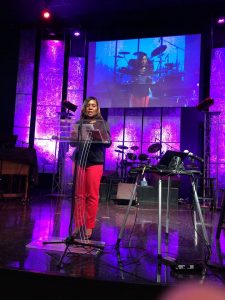
Equity for Women in the Church’s “Calling in the Key of She” program, created by Rev. Clark Chambers, works to change patriarchal culture and religion. The purpose of this program is to develop “female-friendly” congregations that will contribute to this change in our world. “Female-friendly” congregations value females and males as created equally in the divine image, and they work towards gender justice and equality. Female-friendly” congregations believe, based on Genesis 1, that God equally loves, calls, values, and affirms the gifts of females as well as males in the church. These congregations intentionally work to create an inclusive environment where all females are included, welcomed, and affirmed.
In our workshop we went on to illustrate ways faith communities can change language to become more inclusive and “female-friendly.” Inclusive language for humanity and divinity provides a strong foundation for justice and equality. Some people use the term “inclusive” to mean “gender-neutral,” but we use it to mean language that includes females and all genders. Just as the Black Lives Matter movement has taught us that, though all lives matter, we need to name that black lives matter because they have not mattered enough in our culture, so we need to name females in the divine image, though all genders are in the divine image, because the Female Divine has not been named and valued. We need to name that which has been unnamed, demeaned, devalued, and oppressed.
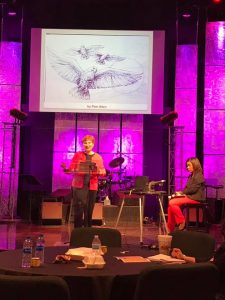 Female names for God are in the Bible. Reclaiming these biblical female divine names affirms the sacred value of females and all people. Here are some of the many biblical female names for God that we pointed out.
Female names for God are in the Bible. Reclaiming these biblical female divine names affirms the sacred value of females and all people. Here are some of the many biblical female names for God that we pointed out.
- Ruah (Hebrew word for “Spirit”), Genesis 1:1-2
- Mother Eagle, Deuteronomy 32:11-12
- Divine Midwife, Psalm 22:9-10
- Woman in labor, (Isaiah 42:14)
- Nursing woman (Isaiah 49:15)
- Comforting Mother (Isaiah 66:13)
- Mother Hen (Matthew 23:37)
- Divine Wisdom (Hokmah in Hebrew, Proverbs 1, 3, 4, 8; Sophia in Greek, 1 Corinthians 1:24, 30)
To illustrate how a biblical divine female name can be used in worship, we showed this video with the song “Listen, Wisdom Is Calling,” from Imagine God! A Children’s Musical Exploring and Expanding Images of God.
In our workshop at Memphis Theological Seminary, Andrea and I talked about changing imagery and practice, as well as language, to create inclusive communities.
Visual images in our churches are also powerful. What messages are sent and received by the images used in churches? Are the pictures representative of a diversity of races, genders, and cultures. Do the images suggest that women have as much value as men, or that women are for the benefit, use, entertainment, and pleasure of men? Do congregants regularly see females in the rituals and ministries of the church? Are all or most of the visual images of the Divine male? Predominantly male imagery of the Divine legitimizes patriarchal power in the culture.
Inclusive imagery for people and for the Divine forms a foundation for gender and racial equality. Our words and visual images can contribute to racial justice by changing the traditional symbolism of darkness as negative and light as positive, naming darkness as sacred and imaging the Divine as dark to emphasize the sacred value of people of color. Including multicultural female divine names and images in worship contributes to gender and racial equality, which intersects with care of creation, economic justice, and other justice concerns.
Inclusive practices also contribute to inclusive communities. Are our churches purposefully inclusive in practices? How do patriarchy, sexism, male privilege, and gender discrimination influence the practices of the church? Do only men move tables and chairs and take out the trash, and only women cook in the kitchen and work in the nursery? Are there equal numbers of men and women on church committees? Are children invited to lead in worship?
How do we create inclusive communities? Clergypersons and laypersons can work together to create inclusive communities.
- Refuse to perpetuate traditional gender stereotypes in the church or in society.
- Refuse to participate in conversations where women and girls are not valued.
- Look for ways to speak positively about women and girls.
- Don’t make sexist jokes or remarks or laugh at them. Call out those who make these jokes and remarks. Remember that your silence gives consent.
- Affirm and support the women in leadership.
- Listen to females and refrain from dismissing their opinions.
- Include female names and images of God.
- Use female examples when talking about biblical topics and social issues.
- Encourage our sons and daughters to see all genders as equal.
- Include women in every aspect of the church.
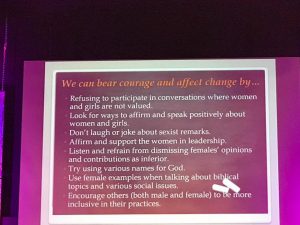 We can create inclusive communities by using inclusive language, imagery, and practices.
We can create inclusive communities by using inclusive language, imagery, and practices.
We concluded our workshop by asking what difference it would make if…
- Little girls grow up in an environment where they know they are loved, valued, and affirmed?
- Females are an active, vital part of the life of the church?
- Little girls hear females in the Bible in a positive light?
- Little girls hear God’s name and it sounds like their own?
- Women and girls feel equal and just as valued as men and boys?
- Males believe that females must fully partner with them to truly fulfill the mission of the church?
We closed with this video with the song “Midwife Divine Now Calls Us,” illustrating a biblical female divine name and multicultural imagery, and challenging us all to move out from our “safest place” to give birth to inclusive communities.
Thanks for this fabulous write-up and all you share!
Thank you, Deb, for your enthusiastic, affirming response!